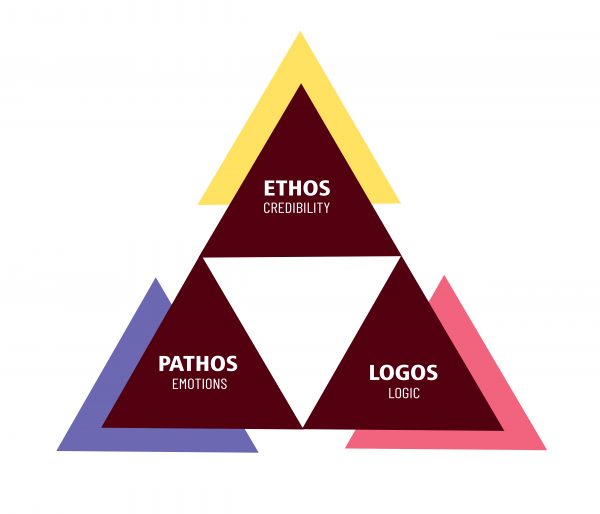If you are writing web content persuading strangers to become customers, are you hitting your ethos, pathos and logos targets?
No, they aren’t the Three Musketeers; they’re the age-old principles of persuasive speech, developed by ancient Greek philosophers into the art or rhetoric and used by great orators ever since to influence audiences.
What do you write content for?
When you’re writing for your business the chances are you’re trying to persuade someone to buy your service or product by changing their opinion behaviour. (How much opinion affects behaviour or behaviour affects opinion is a whole other topic, for another day!).
Even when you’re not directly pitching to a hot prospect, you’re probably sharing information about your business. Or maybe you’re displaying your credentials, or connecting on an emotional level with your audience (perhaps through shared values). You may also be giving out free information to make them like you; quite possibly you’re doing all three.
Every piece of business content you write should have a purpose. Using the principles of rhetoric can give more clarity about your aim as well as the tools to use to achieve it. This keeps your writing both relevant and effective.
The art of persuasion
One of the best ways to ensure your writing stays persuasive and influences changes in opinion and behaviour is to use the rhetorical triangle. Developed by the Greek philosopher Aristotle over 2,300 years ago, it’s no new marketing trend! It’s a tried and tested approach to creating persuasive arguments, both written and spoken, and was considered an essential part of education for centuries.

The rhetorical triangle consists of three key elements:
-
Ethos:
This defines you as the writer and establishes your credibility and authority. It proves to the audience that you can be trusted as an expert. Your readers want to establish your credibility, to decide whether you are sincere, honest, professionally capable; ie someone they can trust to do business with. Advertisers use ethos when they ask celebrities or experts to endorse a brand.
-
Logos:
This is the rational argument and includes facts and data as evidence to back up what you’re saying. The logos appeals to a reader’s logic and demonstrates your reasoning, so it’s important to construct a clear and concise message that can easily be followed. These reassure readers that the product actually works. Think of the survey results that tell us how many users like a product and what percentage it works for.
-
Pathos:
This is the emotional aspect of a persuasive argument. Creating emotions makes the audience feel engaged and encourages them to take action, that the product can work for them and solve their particular problem. This is difficult to achieve because you’re usually communicating with strangers. But you can take steps to understand the audience you want to appeal to and build an emotional connection with them. Think carefully about the emotions you want to evoke and whether they are tuned with the values your targeted audience hold. An example from advertising is showing us what happens to gums if we don’t brush regularly, raising feelings of concern or revulsion.
Putting rhetorical principles into practice
The concept of the rhetorical triangle is a powerful tool for understanding how to persuade and influence the reader. Using this idea, you can structure your thoughts and check that you’ve included the key elements in your messaging, either within a single item or across a whole campaign. Getting the balance right is also important. If you miss a side of the triangle your argument can be weakened. You have very little enough time as it is to capture the attention of a reader, so don’t waste the opportunity by making your message unclear or by failing to nail these methods of persuasion.
Next time you’re writing for your business, imagine yourself in the Athenian Agora, using ethos, logos and pathos to connect, engage and persuade your audience to taka action and make history.
Bill Blogs
If you’d like to discuss how your website content could become more persuasive, or you’re too busy running your business to write your own content, then contact Bill Blogs at bill@billblogs.co.uk or ring 07981 269162 and we can explore some potential solutions.




